Lining up next to an overly aggressive local cyclist earlier this year, João Correia tried to d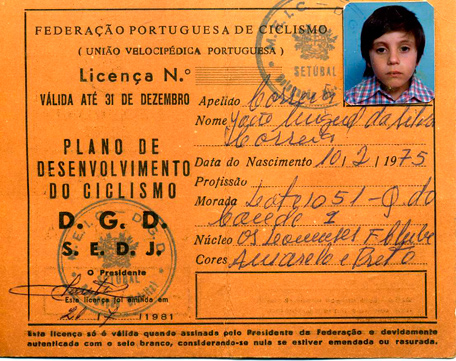 efend another rider whom he felt had been unfairly targeted. The obnoxious racer glared at João then boastfully asked, “Do you know who I am? Do you know who I am?â€
efend another rider whom he felt had been unfairly targeted. The obnoxious racer glared at João then boastfully asked, “Do you know who I am? Do you know who I am?â€
João just laughed to himself; in New York you can’t go away for a long weekend without people forgetting who you are.
Nevertheless, you should know who João is—at least so that, in case you weren’t riding around here for the past fifteen years, you can avoid making the mistake of putting your finger in his chest and making a fool of yourself.
Out of Portugal
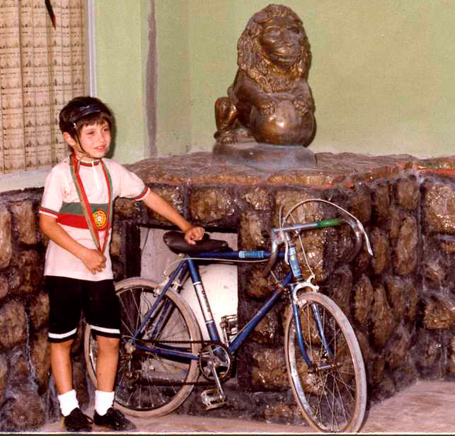 “I left Portugal in 1986 at the age of 11,†João remembers. “My father took us on a vacation to the U.S. and we never returned home; he wanted to do something different, for his family to see more. Portugal can be a small, closed place, not open to new ideas or people. In Portugal, our hometown was right outside of Lisbon. My father was the D.S. of a local amateur team. For a long time after we came to the U.S. I was afraid to leave, because we didn’t have green cards. We were afraid we wouldn’t be let back in.
“I left Portugal in 1986 at the age of 11,†João remembers. “My father took us on a vacation to the U.S. and we never returned home; he wanted to do something different, for his family to see more. Portugal can be a small, closed place, not open to new ideas or people. In Portugal, our hometown was right outside of Lisbon. My father was the D.S. of a local amateur team. For a long time after we came to the U.S. I was afraid to leave, because we didn’t have green cards. We were afraid we wouldn’t be let back in.

“Already, at 11, I was a veteran racer intent on a career in cycling. In Portugal I had raced since I was six years old, and even in that young age group, races had 20 or more kids starting them. In the U.S. we had only a dozen or so at that age. Because of my experience, I was able to ride with the older kids—first the 14-year-olds when I was 11, then the 16- and 17-year-olds when I was 14, until as a 16-year-old I was able to race with senior 1-2 men. I would frequently race both races: junior and senior on the same day.â€

This was during the period wistfully remembered as a golden age for New York City juniors, becausethe fields were so big and the competition so intense. João remembers racing with Dave Jordan, Patrick Gellineu, Ray Diaz (overdue for a NYVC interview) and, of course, George Hincapie. I asked João about George, recalling that many people around NYC were surprised that he became such a strong, all-around racer, since he was more of a sprinter as a junior. João remembers otherwise.
“No, I wasn’t surprised at all. He was already a phenom at 16. Others of us were good—good enough for international competition even—but he was already a cut above everyone, juniors and seniors. I mean, Mengoni resurrected his team just so he could have George ride for him, and the already dominant Toga became a powerhouse when he was on it.â€
Cycling full time
“I was racing for Sleepy Hollow in 1991 when I won the Cat 1-2 Bear Mountain road race, the district championships then [he was only 16!]. My team Sleepy Hollow had set it up for me, and I attacked on the climb and soloed the last lap and a half. Dave Jordan won the sprint and came in second; he was declared the official winner because I wasn’t a U.S. citizen.†Author’s note: Dave Jordan is like the Kevin Bacon of NY cycling, he always seems to appear in these stories and will do so again.
João’s Bear Mountain victory has taken on near-legendary status. His friends and teammates often repeat the story as a testament to his talent, and João himself has been known to bring it up on occasion. After he left the city and went on to bigger victories, his accomplishment at Bear Mountain retained a special place in his heart, a testament to how much his New York experience means to him, both then and now.
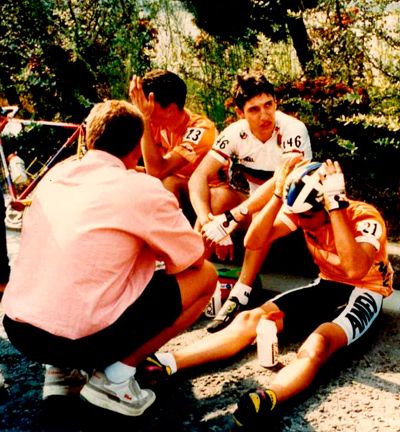 “That same year I did the Junior Worlds as the sole representative of Portugal. It was my first of three Junior Worlds, which must be a record. The Dutch team took care of me, since Portugal didn’t send a squad to the Worlds. The first year I was very young, so my goal was to just finish. I sprinted against an American and two guys from Belgium, and narrowly avoided coming in dead last. Out of 173 starters there were only 75 finishers. In the next two Worlds, in Greece and Australia, I came in 14th. I remember in Greece I attacked on the final climb with Frank Vandenbroucke. My chain came off and slipped into the frame as I was shifting, and he went on to stay away and finish 3rd.â€
“That same year I did the Junior Worlds as the sole representative of Portugal. It was my first of three Junior Worlds, which must be a record. The Dutch team took care of me, since Portugal didn’t send a squad to the Worlds. The first year I was very young, so my goal was to just finish. I sprinted against an American and two guys from Belgium, and narrowly avoided coming in dead last. Out of 173 starters there were only 75 finishers. In the next two Worlds, in Greece and Australia, I came in 14th. I remember in Greece I attacked on the final climb with Frank Vandenbroucke. My chain came off and slipped into the frame as I was shifting, and he went on to stay away and finish 3rd.â€
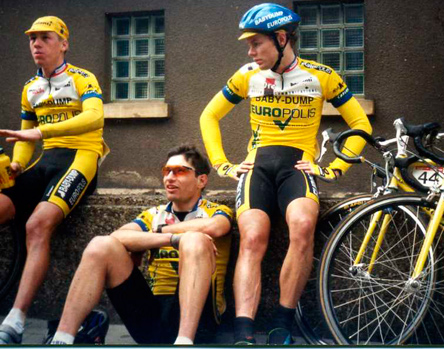 The next step was to move to Europe to pursue his dream of signing a pro contract. João ran into Dave Jordan, who helped him hook up with a team in the south of France, La Pedale Chalonaise. Another New Yorker, Mark Gulickson, got him a chance to ride for a team in Brittany (CC Chateaubriant), which was then a real hotbed of cycling.
The next step was to move to Europe to pursue his dream of signing a pro contract. João ran into Dave Jordan, who helped him hook up with a team in the south of France, La Pedale Chalonaise. Another New Yorker, Mark Gulickson, got him a chance to ride for a team in Brittany (CC Chateaubriant), which was then a real hotbed of cycling.
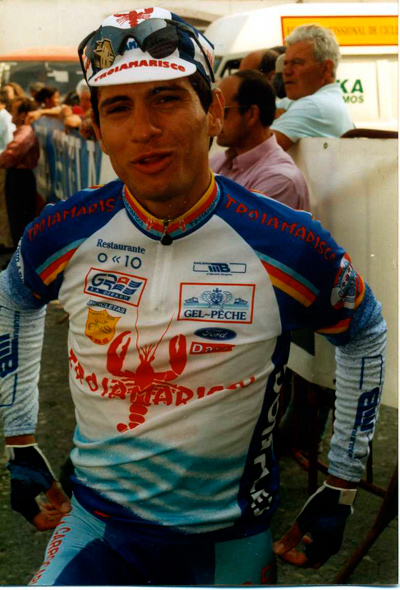 “In my first race in Brittany I remember some big teams were there. I got popped about halfway through the race; I couldn’t believe the speeds. When my D.S. drove up to me, I told him I was quitting. I said, ‘I’m not good enough for this so I’m going back to New York.’ He just laughed at me and said ‘You’ll get used to it’ and he told me I’d win the classic Nantes-Mortagne the following month. I though he was nuts, but sure enough I won. I went on to race for the Portuguese national team and then tried to get a contract with the Banesto amateur team at the end of the season, but that didn’t materialize. (Ironically had it worked out João would have ridden with Miguel Morras, then a rookie on the amateur team).
“In my first race in Brittany I remember some big teams were there. I got popped about halfway through the race; I couldn’t believe the speeds. When my D.S. drove up to me, I told him I was quitting. I said, ‘I’m not good enough for this so I’m going back to New York.’ He just laughed at me and said ‘You’ll get used to it’ and he told me I’d win the classic Nantes-Mortagne the following month. I though he was nuts, but sure enough I won. I went on to race for the Portuguese national team and then tried to get a contract with the Banesto amateur team at the end of the season, but that didn’t materialize. (Ironically had it worked out João would have ridden with Miguel Morras, then a rookie on the amateur team).
In 1995 I ended up turning pro for the Portuguese Continental Team Troiamariscos and raced in Portugal that year, with some racing in the US as well.†When he came to the states that summer, he won Park Ridge and a handful of local races—notable, but hardly the palmares he’d dreamed of.
“When nothing worked out I came back to the U.S. and resigned myself to putting it all behind me and going to school. Out of the blue in the fall of 1995 Jan Gisbers, ex-director of the Dutch team PDM, called me and said my name was on a list of promising U.S. riders that Greg LeMond had given to him. I had never met Greg and I didn’t know anyone who knew him; in fact to this day I still don’t know how I got on that list. But I hurried back to Europe and raced for one more season with Europolis-Baby Dump in Holland. I was part of the team that raced mostly internationally and had a good season including winning the Belgian classic Grand Prix des Trois Frontiers. This was 1996 and the racing was just incredibly fast—especially the climbing. In retrospect I realize that a lot of funny stuff was going on behind the scenes in those days: the drug abuse was rampant. I came back to New York at the end of that season and went to school full time at Fordham. I thought I had put cycling behind me for good this time.â€
Act 2
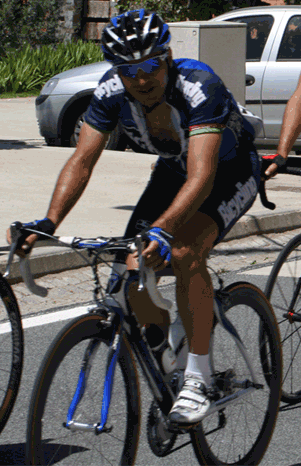 Anyone meeting João just a year ago would never have guessed that he was ever a serious cyclist. From 1997 until 2004, João didn’t really ride. During that time he’d begun working in the magazine business following an internship at Hearst, and, like a lot of busy New Yorkers, he ate out a lot. Only 12 months ago he weighed in at 185 pounds, and he is not a tall man. He started doing a few local races in order to regain a bit of fitness, but didn’t commit to a comeback until, during a Granfondo in Italy, one of his clients noted that, for a heavy man, João was surprisingly strong.
Anyone meeting João just a year ago would never have guessed that he was ever a serious cyclist. From 1997 until 2004, João didn’t really ride. During that time he’d begun working in the magazine business following an internship at Hearst, and, like a lot of busy New Yorkers, he ate out a lot. Only 12 months ago he weighed in at 185 pounds, and he is not a tall man. He started doing a few local races in order to regain a bit of fitness, but didn’t commit to a comeback until, during a Granfondo in Italy, one of his clients noted that, for a heavy man, João was surprisingly strong.
“He sort of wondered aloud if I could still be an elite cyclist if I were to train and lose the extra weight. I’m a competitive person by nature and I knew that if I were to try it I had to really give it my all, so I hired a coach, Dr. Max Testa and his colleague the sport nutritionist Dr. Nanna Meyer at the TOSH Hospital , went on a diet, and began riding more seriously since November of last year.
“In May of 06 I weighed 185 pounds and I’d already lost 10 pounds or so, now I’m 155, next year I’d like to be 145 or so. I’m excited to try and stay in shape and race for a few more years. Cycling has really changed. It’s much more mainstream, it’s actually an option for people looking for a hobby or exercise. That wasn’t true 15 years ago, when it was much more fringe. The racing is also much better now. People are more fit and there’s so much information allowing for people to train more effectively. And of course there are so many more riders and local teams. I think it’s much more fun to race now!â€
The Future
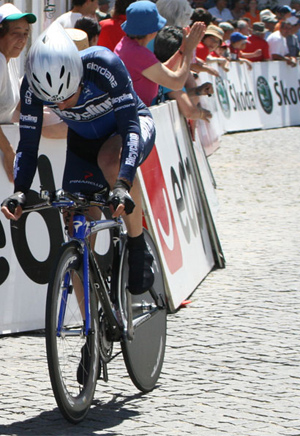 Today João can be found close to the top of Bicycling magazine’s masthead as an associate publisher in charge of advertising sales. After stints at SmartMoney and Esquire, João landed at Bicycling, a natural fit. He is also a proud father who notes that his son’s favorite word is “bike,†and naturally the toddler already owns three of them, even though he’s still just two years old. This comes as no surprise to anyone aware of João’s quiet efforts to develop and promote Junior cycling. With his position at Bicycling providing some additional clout, João has been an active backer of both the Sakonnet and CRCA Junior development teams, arranging for sponsorships, bikes, kits, and just about anything else a young team might need. “I had a ton of help when I was a Junior from people like the Whalen triplets and now that I am in a position to help young riders I really try to do that.â€
Today João can be found close to the top of Bicycling magazine’s masthead as an associate publisher in charge of advertising sales. After stints at SmartMoney and Esquire, João landed at Bicycling, a natural fit. He is also a proud father who notes that his son’s favorite word is “bike,†and naturally the toddler already owns three of them, even though he’s still just two years old. This comes as no surprise to anyone aware of João’s quiet efforts to develop and promote Junior cycling. With his position at Bicycling providing some additional clout, João has been an active backer of both the Sakonnet and CRCA Junior development teams, arranging for sponsorships, bikes, kits, and just about anything else a young team might need. “I had a ton of help when I was a Junior from people like the Whalen triplets and now that I am in a position to help young riders I really try to do that.â€
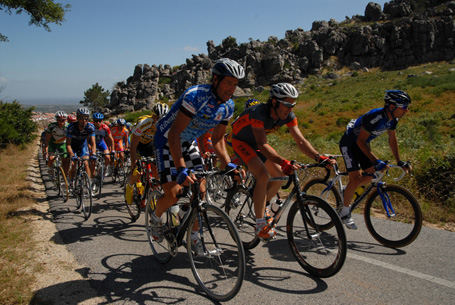 One can’t help but to think that João’s failure to secure a professional cycling contract with a big team in Europe was actually a blessing in disguise. After losing so many of his formative years to racing, it’s impressive to see how far he has ascended in his career. At the age of 32, João’s profession and his passion are finally one. “I’m fortunate to have re-found the sport but also have a great job and a great family.†Not too many pro cyclists, let alone retired ones, have lives as enviable as João’s, even though he may have to endure the occasional tirade from egotistical local racers who ought to know better.
One can’t help but to think that João’s failure to secure a professional cycling contract with a big team in Europe was actually a blessing in disguise. After losing so many of his formative years to racing, it’s impressive to see how far he has ascended in his career. At the age of 32, João’s profession and his passion are finally one. “I’m fortunate to have re-found the sport but also have a great job and a great family.†Not too many pro cyclists, let alone retired ones, have lives as enviable as João’s, even though he may have to endure the occasional tirade from egotistical local racers who ought to know better.
______________________________
Photos:
1 Portuguese racing licence, 1981
2 Portuguese National Champion, 1981
3 Mid 80’s local team in Portugal. João is the 2nd from the left. My father is 3rd from the left.
4 Big field in Kids racing at the time in Portugal, João is 2nd from the right
5 Athens Jr Worlds 92
6 Team Europolis ’96
7 Troiamarisco ’95
8 Bicycling Magzine team leader 2007 at the Pro Nationals
9 Portuguese TT Nationals on the way to 11th place 2007
10 In the front of the field 2007 Pro Nationals
